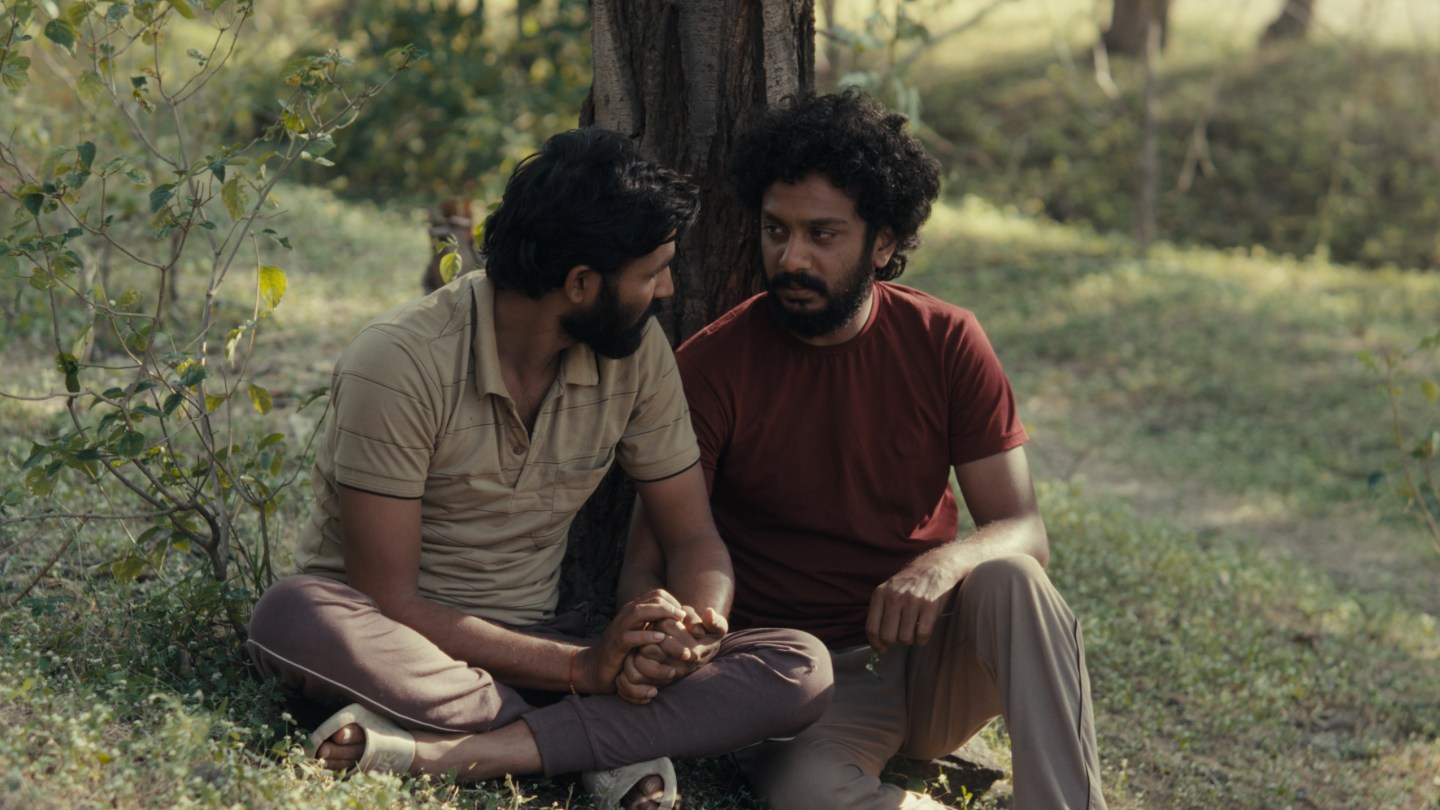Rohan Kanawade‘s Cactus Pears begins with the unexpected heartbreak of grief. At the start of this delicate and understated love story, which took home the World Cinema Grand Jury Prize at Sundance earlier this year, Anand (Bhushaan Manoj) and his family tearfully gather in a hospital waiting room. Their patriarch, Anand’s father, has died, and the news sends a melancholic ripple through the despondent clan.
“Yesterday, he kept saying, ‘I’m tired of all this,’” Anand’s mother (Jayshri Jagtap) sputters through tears. Too often, what feels sudden to the living is inevitable to the dying.
Cactus Pears
The Bottom Line
Understated and elegant.
Cast: Bhushaan Manoj, Suraaj Suman, Jayshri Jagtap
Director-screenwriter: Rohan Parashuram Kanawade
1 hour 52 minutes
Working with cinematographer Vikas Urs, Kanawade, directing from a screenplay he also wrote, stages this early mourning scene with an appropriate sense of claustrophobia. The frame snugly encases the family in ways that recall the bereavement scenes in On Becoming a Guinea Fowl, and like Shula, the protagonist of Rungano Nyoni’s haunting Zambian drama, Anand is forced to alter the shape of his grief to fit the contours of cultural obligations.
Cactus Pears follows the young man, so used to life in bustling Mumbai, as he returns to the countryside for the 10-day funeral rites of his father. There, among the rolling hills and verdant landscape, Anand reunites with an old friend (Suraaj Suman) and comes to terms with the tension between his desire and his culture.
In less assured hands, Cactus Pears might have edged into trite territory, yielding to the familiar beats of traumatic queer love stories, but Kanawade’s considered direction and spare storytelling keeps the narrative refreshing. The director stages two threads that run parallel until they unexpectedly harmonize near the end.
The first observes Anand as he learns and performs the rituals required for his father’s funeral while awkwardly dodging questions about his relationship status. His arrival in the small village is met with intense scrutiny by aunts, uncles and cousins who wonder why he hasn’t found a wife yet. One relative warns that now that Anand’s father is dead, the marriage timeline must naturally be accelerated.
But what seems logical to them isn’t for Anand, who doesn’t want to marry a woman. The second thread in Cactus Pears follows the city kid as he falls in love with a country boy, his childhood friend Balya (Suman). Their most meaningful encounters take place far away from the hustle and bustle of a grieving household, Anand following Balya as he herds goats, milks cows and does other tasks around the farm.
Their lives have taken different paths since they were boys. While Anand recovers from heartbreak over his lover in Mumbai, Balya engages in brief, emotionally disconnected affairs with other closeted men in the area. Balya’s parents are trying to arrange a marriage between him and a village girl, but the farmhand has been avoiding those conversations. Meanwhile, Anand’s mother urges her son to keep his sexuality a secret — a request Anand’s father seemingly never made of him.
These two lost souls find something in each other, and thanks to subtle performances by Manoj and Suman, the audience gets to bask in its glow. Their intimacy is measured by physical proximity. Early in their reconnection, Anand and Balya leave a respectable gap between them. As they smoke cigarettes and talk about what happened in the years they fell out of touch, they sit like strangers trying to get to know each other. As the days pass and their hangouts increase, the distance between them shrinks until they are caressing each other’s hands and hugging under a tree.
The beauty of Cactus Pears depends on these details, seemingly minor moments that build a compassionate love story. Manoj gives an especially compelling performance as a withdrawn figure whose personality expands as this romance develops. In one particularly sweet scene, Anand watches Balya use a shampoo he’s recommended, and although they are in public — in the background, an auntie prepares dinner — their language feels private. Anand, with his arms folded over his chest, can’t help but smile as he looks at his lover bathe. It’s moments like these that align Cactus Pears with Viet and Nam, Truong Minh Quy’s dreamy third feature about love and historical haunting
Of course, as with any romance, Anand and Balya’s has its troubles. As the end of the mourning period looms, the couple must decide what their future holds. Kanawade presents these challenges with a consistent restraint, never relying on melodrama to drive his points home. As Anand assumes more responsibilities within the funeral rites, he also comes to terms with how he wants to position himself as an adult within this family. The threads of his narrative begin to resemble a kind of delicate coming-of-age story, one that frames coming into one’s true self as a series of small but courageous actions.
